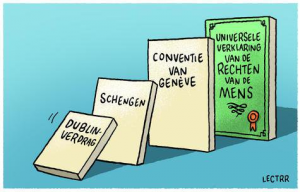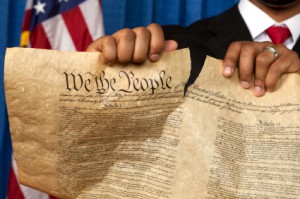Analysis
België en de vluchtelingencrisis: de zoektocht naar oplossingen
- Posted on January 5, 2016
- /Under Analysis
- /With 0 Comments
Yves Ballez, Ariadne Frangi, Thomas Ngeze en Dorien Surinx (masterstudenten Grondige Studie Grondwettelijk Recht, UGent), Pieter Cannoot (assistent, UGent) en Juan Benjumea Moreno (assistent, UGent)
Volgens VN -vluchtelingenorganisatie UNHCR hebben we het trieste recordaantal van bijna 60 miljoen gedwongen ontheemden bereikt. De conflicten in Syrië, Irak en Jemen zorgen voor een vluchtelingenstroom die meer en meer richting de Europese Unie trekt. Uiteraard leidt deze toestroom tot belangrijke uitdagingen. Staten dragen op grond van het internationaal recht immers een belangrijke verantwoordelijkheid ten aanzien van vluchtelingen. Bovendien dient de EU een krachtig, gemeenschappelijk en effectief antwoord te bieden op deze crisis. De aanwezigheid van vluchtelingen in Europa zet de regeringen alvast aan het denken, zo ook op het terrein van de sociale rechten. “Het is ofwel open grenzen en gecoördineerde migratie, ofwel gesloten sociale zekerheid ” luidde het bij N-VA voorzitter Bart De Wever. Dient de Conventie van Genève inderdaad geüpdatet te worden? Kunnen we dit probleem gestructureerd aanpakken op Europees niveau, door bijvoorbeeld de buitengrenzen strenger te bewaken en de asielaanvragen evenredig te verdelen? Of moet België dan maar zelf voorzorgsmaatregelen nemen door een apart sociaal statuut voor vluchtelingen in te voeren?
-vluchtelingenorganisatie UNHCR hebben we het trieste recordaantal van bijna 60 miljoen gedwongen ontheemden bereikt. De conflicten in Syrië, Irak en Jemen zorgen voor een vluchtelingenstroom die meer en meer richting de Europese Unie trekt. Uiteraard leidt deze toestroom tot belangrijke uitdagingen. Staten dragen op grond van het internationaal recht immers een belangrijke verantwoordelijkheid ten aanzien van vluchtelingen. Bovendien dient de EU een krachtig, gemeenschappelijk en effectief antwoord te bieden op deze crisis. De aanwezigheid van vluchtelingen in Europa zet de regeringen alvast aan het denken, zo ook op het terrein van de sociale rechten. “Het is ofwel open grenzen en gecoördineerde migratie, ofwel gesloten sociale zekerheid ” luidde het bij N-VA voorzitter Bart De Wever. Dient de Conventie van Genève inderdaad geüpdatet te worden? Kunnen we dit probleem gestructureerd aanpakken op Europees niveau, door bijvoorbeeld de buitengrenzen strenger te bewaken en de asielaanvragen evenredig te verdelen? Of moet België dan maar zelf voorzorgsmaatregelen nemen door een apart sociaal statuut voor vluchtelingen in te voeren?
The Determinants of Emergency Constitutions
Prof. Dr. Stefan Voigt, Director Institute of Law & Economics, University of Hamburg
Prof. Dr. Christian Bjørnskov, Aarhus University
Today, some 90 per cent of all constitu tions worldwide contain explicit provisions for how to deal with states of emergency. And they are used quite frequently. Between 1985 and 2014, at least 137 countries declared a state of emergency at least once. Under a state of emergency, some individual rights and liberties are usually suspended and the separation of powers is curtailed in favour of the executive or even a single person like the head of state or government and, by implication, to the detriment of parliament and the courts. Given that states of emergency can be crucial moments for the development of entire countries and taking into consideration how frequently they are used, it is amazing how little we know about constitutional emergency provisions.
tions worldwide contain explicit provisions for how to deal with states of emergency. And they are used quite frequently. Between 1985 and 2014, at least 137 countries declared a state of emergency at least once. Under a state of emergency, some individual rights and liberties are usually suspended and the separation of powers is curtailed in favour of the executive or even a single person like the head of state or government and, by implication, to the detriment of parliament and the courts. Given that states of emergency can be crucial moments for the development of entire countries and taking into consideration how frequently they are used, it is amazing how little we know about constitutional emergency provisions.
Measuring the Rule of Law and Identifying Its Determinants
- Posted on November 30, 2015
- /Under Analysis
- /With 0 Comments
Prof. Dr. Stefan Voigt, Director Institute of Law & Economics, University of Hamburg
 There is an almost universal consensus that the rule of law is desirable. Given this enthusiasm, it is remarkable how little is known about the factors conducive to it. A precondition for improving our knowledge of the rule of law is the ability to measure it. In a paper recently posted on the internet, together with Jerg Gutmann I set out to do just that. Based on very extensive data from a survey carried out in 99 countries, we propose a new indicator for the rule of law. It is the first such indicator that explicitly takes the quality of legal norms into account. If the rule of law means that legislation is general and applies to all individuals in a like fashion, taking the characteristics of the law explicitly into account seems crucial.
There is an almost universal consensus that the rule of law is desirable. Given this enthusiasm, it is remarkable how little is known about the factors conducive to it. A precondition for improving our knowledge of the rule of law is the ability to measure it. In a paper recently posted on the internet, together with Jerg Gutmann I set out to do just that. Based on very extensive data from a survey carried out in 99 countries, we propose a new indicator for the rule of law. It is the first such indicator that explicitly takes the quality of legal norms into account. If the rule of law means that legislation is general and applies to all individuals in a like fashion, taking the characteristics of the law explicitly into account seems crucial.
Recent developments in Scotland’s and Catalonia’s struggle for independence
- Posted on November 17, 2015
- /Under Analysis
- /With 0 Comments
Vicky Vanhoutte, Kris Merckx, Laurent De Clercq and Hannes Speeckaert (Master students Advanced Study Constitutional Law, UGent), Pieter Cannoot (assistant, UGent) and Juan Benjumea Moreno (assistant, UGent)
Several member states of the European Union have been confronted with increasing demands for subnational regionalisation in the past few years. The origin of these independence movements is closely related to the political and economic context of a region. Therefore, the constitutional road towards independence is complex. The differences between Scotland and Catalonia in their process to potential independence exemplify this perfectly. In the wake of the historic year 2014, this post provides an overview of the recent developments in the Scottish and Catalan independence movements.
Recente ontwikkelingen in het onafhankelijkheidsstreven van Schotland en Catalonië
Vicky Vanhoutte, Kris Merckx, Laurent De Clercq en Hannes Speeckaert (masterstudenten Grondige Studie Grondwettelijk Recht, UGent), Pieter Cannoot (assistent, UGent) en Juan Benjumea Moreno (assistent, UGent)
Verschillende lidstaten van de Europese Unie worden de laatste jaren geconfronteerd met een steeds toenemende vraag naar sub-statelijke regionalisering. Steeds meer regio’s streven immers naar meer autonomie, of zelfs onafhankelijkheid. De oorsprong van dit onafhankelijkheidsstreven hangt nauw samen met de politieke, historische en economische context van een regio. De grondwettelijke weg naar onafhankelijkheid is dan ook geen eenduidig gegeven. De verschillen tussen Schotland en Catalonië in hun proces naar een mogelijke onafhankelijkheid vormen hiervan het perfecte bewijs. Na het historische jaar 2014, biedt dit bericht een overzicht van de recente ontwikkelingen in het Schotse en Catalaanse onafhankelijkheidsstreven.
Challenges to democracy in the 21st century – Interview with Yves Leterme
- Posted on October 27, 2015
- /Under Analysis
- /With 0 Comments
 Yves Leterme is a well-known Belgian politician. Since 2014, he has been Secretary-General of the International Institute for Democracy and Electoral Assistance (International IDEA). On the 12th of October 2015, BelConLawBlog celebrated its one year existence. For this occasion we welcomed Yves Leterme to give a lecture about the challenges to democracy in the 21st century. Karen Poppeliers, master student of the Advanced Study Constitutional Law (Ghent University), further discussed the topic with mr. Leterme, which led to a very interesting interview.
Yves Leterme is a well-known Belgian politician. Since 2014, he has been Secretary-General of the International Institute for Democracy and Electoral Assistance (International IDEA). On the 12th of October 2015, BelConLawBlog celebrated its one year existence. For this occasion we welcomed Yves Leterme to give a lecture about the challenges to democracy in the 21st century. Karen Poppeliers, master student of the Advanced Study Constitutional Law (Ghent University), further discussed the topic with mr. Leterme, which led to a very interesting interview.
Right to happiness: a new constitutional approach
- Posted on October 8, 2015
- /Under Analysis
- /With 0 Comments
Saul Tourinho Leal, Visiting researcher at SAIFAC, PhD in Constitutional Law and President of the "Sub-Committee on Foreign Relations with South Africa" of the Brazilian Bar Association.
Justice Albie Sachs, when closing his presentation in The College of Law’s Ray Distinguished Lecture at the University of Kentucky on April 12, 2013, stated that he believed that the establishment of the Constitution of South Africa by the Constitutional Court “brought a lot of happiness and a lot of emancipation to many people". Would it be a role of the Judiciary to assure happiness for the people? Is it appropriate for a Supreme Court to consider happiness to be a right?
Constitutional Court upholds “New BHV”
- Posted on September 30, 2015
- /Under Analysis
- /With 0 Comments
Stefan Grazidei, PhD student at the Faculty of Law, University of Antwerp.
Over the last years, the Belgian Constitutional Court has been confronted with an array of legal challenges to the institutional agreement on the sixth state reform. The latest of these attempts to judicially unwind the reform was decided by the Court at the end of May 2015. The Flemish nationalist party N-VA had petitioned the Court. Object of the controversy was the long disputed Brussels Halle Vilvoorde electoral district (BHV). Although split for the Chamber of Representatives, BHV continued to exist for the election of the so-called “coopted” senators. The decision impinges on the broader territoriality v. personality debate in Belgian constitutional law and shows the Court’s rather prudent approach in politically salient cases that divide Belgian language communities.
We the People: tijd voor meer directe democratie na de zesde staatshervorming?
- Posted on July 3, 2015
- /Under Analysis
- /With 0 Comments
Katrien Bernard, Niels De Bruyn en Carl Kyndt (masterstudenten UGent), Jurgen Goossens (doctoraal onderzoeker, UGent) en Pieter Cannoot (assistent, UGent)
 Sinds de befaamde Koningskwestie in 1950 is België een koele minnaar van volksraadplegingen. De zesde staatshervorming heeft met de invoering van gewestelijke volksraadplegingen echter een (beperkte) stap gezet naar meer directe democratie. Dit zou een opstap kunnen zijn naar een bredere discussie over een wijziging van de grondwetsherzieningsprocedure in artikel 195 van de Grondwet, zodat de burger mee zou kunnen beslissen over het aanpassen van de meest fundamentele tekst van ons land.
Sinds de befaamde Koningskwestie in 1950 is België een koele minnaar van volksraadplegingen. De zesde staatshervorming heeft met de invoering van gewestelijke volksraadplegingen echter een (beperkte) stap gezet naar meer directe democratie. Dit zou een opstap kunnen zijn naar een bredere discussie over een wijziging van de grondwetsherzieningsprocedure in artikel 195 van de Grondwet, zodat de burger mee zou kunnen beslissen over het aanpassen van de meest fundamentele tekst van ons land.
We the People: more direct democracy after the sixth state reform?
- Posted on July 3, 2015
- /Under Analysis
- /With 0 Comments
Katrien Bernard, Niels De Bruyn and Carl Kyndt (master students UGent), Jurgen Goossens (doctoral researcher, UGent) and Pieter Cannoot (assistent, UGent)
Ever  since the well-known Royal Question (1950), Belgium has been suspicious of referenda. The sixth state reform, however, took a small step towards direct democracy by introducing regional non-binding referenda. This innovation could prompt a broader discussion on changing the constitutional amendment procedure (article 195 of the Belgian Constitution) itself and the introduction of direct citizen participation in the amendment of the country’s most fundamental text.
since the well-known Royal Question (1950), Belgium has been suspicious of referenda. The sixth state reform, however, took a small step towards direct democracy by introducing regional non-binding referenda. This innovation could prompt a broader discussion on changing the constitutional amendment procedure (article 195 of the Belgian Constitution) itself and the introduction of direct citizen participation in the amendment of the country’s most fundamental text.


